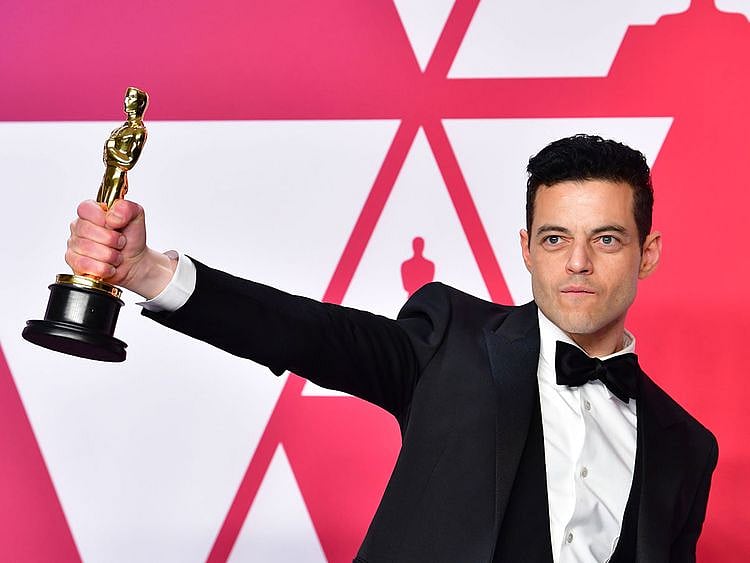Can we finally end the chapter on Rami Malek, who took an embarrassing tumble off the stage at the Academy Awards ceremony? After all, the man still walked away with the most prestigious symbol of achievement by an actor in Hollywood.
The annual ceremony, first broadcast in 1930 on radio and televised for the first time in 1953, is not just the biggest night in the film industry, where excellence in cinematic art is recognised, but indisputably the most anticipated by film buffs. Its equivalents, the Emmy awards, for television, the Tony Awards, for theatre, and the Grammy Awards, for music, cannot hold the candle to it in renown, glamour and sway.
In his acceptance speech, the Los Angeles-born Malek, 37, made a point to project pride in his ethnic background.
“I’m the son of immigrants from Egypt,” he said. “I’m a first generation American and part of my story is being written now.”
Clearly, Egyptians along with other Arabs were proud that one of their own is now a megastar in Hollywood — he came, he saw, he conquered, as it were. For, let’s face it, in a pitiless place like Tinseltown, it’s easy to come and to see, but often it’s all but impossible to conquer, unless you’re endowed with exceptional talent, drive and self-confidence.
Crowded field
Though Malek has, in a way, made history with his win, he is one in a crowded field of Arab and Arab-American auteurs who have in recent years received accolades for their oeuvres. Consider, as a case in point, the engaging feature film The Insult (2017), directed by the Lebanese American filmmaker Ziad Doueri, which was nominated for Best Foreign Language Film, and Capernaum, entered this year also for Best Foreign Language Film on behalf of the young Lebanese director Nadine Labaki. Both films won global attention and national release across the US, but, alas, failed to win Oscars.
Neither did The Square (2017), directed by the Egyptian-American documentarian Jehane Noujaim, or the drama film Wajda (2012), Saudi Arabia’s first entry at the Academy, for Best Foreign Language Film, directed by Haifa Al Mansour. No matter.
Both works had garnered numerous awards at film festivals around the world.
Arab-American actors abound too, the most prominent among whom must be Wisconsin-born Tony Shalhoud. Though he had been awarded a Golden Globe for Best Actor for his role in The Siege (1998), an Oscar continued to elude him. An Oscar equally continued to elude that other Shalhoud, this one Michel Shalhoud, otherwise known professionally as Omar Sharif, who was nominated for Best Supporting Actor in the epic Lawrence of Arabia (1962).
Critics often griped about Sharif’s “modest range” as an actor. But, to be fair, he was hardly given roles to play where he would’ve been able to evince range, having often being called upon (presumably because of his looks and accent) to play “exotic” or “foreign” characters — an Arab in Lawrence, a Russian in Doctor Zhivago (1965), a German in Funny Girl (1968), an Argentine in Che (1969), an Afghan in The Horsemen (1971) and, later in his career, a Turk in Monsieur Ibrahim (2003). Talk about typecasting! Then there’s Carolyn “Carrie” Khouri, who wrote and won an Oscar for Best Original Screenplay for the classic Thelma and Louise (1991), and there’s the enchanting actress Salma Hayek, whose father had originally emigrated to Mexico from Lebanon.
Hayek earned critical acclaim, including a nomination for Best Actress for starring in Frida (2002), about the surrealist Mexican painter Frida Khalo. And let’s not forget the Syrian-American filmmaker Mustafa Akkad, who sat in the director’s chair for the horror movie series Halloween, and for Lion Of The Desert (1981), about the life of Libyan rebel leader Abdul Qader Mukhtar, with the lead role played by Anthony Quinn, whom we all remember as the fiercely independent Auda Abu Tayi, head of the Huweitat tribe, in Lawrence.
Beyond these folks, the field, I say, is crowded with Arab and Arab-American auteurs.
But more significant is the fact that Hollywood has changed, much as the mass sensibility in American society has done — despite regressive talk of border walls, Muslim bans and “[expletive] countries”. In any culture (that of Hollywood included) the winds of change blow constantly and each generation (that of filmmakers included) judges anew. Ideas advanced about blacks at one time, say, in Birth of A Nation (1916) and about Arabs in another, say, in True Lies (1994), will be sanctified as licit by one era only to be dismissed as callous by another.
The big picture is this: As the Academy turns the corner toward its 100th birthday, it is clear that the film industry is striving to bring a tone of pluralism and equity to that most alluring of art forms we call filmic art. That’s always good news for cineastes everywhere.
Fawaz Turki is a journalist, lecturer and author based in Washington. He is the author of The Disinherited: Journal of a Palestinian Exile.
Sign up for the Daily Briefing
Get the latest news and updates straight to your inbox
Network Links
GN StoreDownload our app
© Al Nisr Publishing LLC 2026. All rights reserved.
